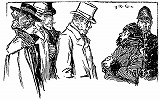“Well, well, if it was fastened the steps could have nothing to do with the matter. That’s common sense. Man might have died in a fit; but then the jewels are missing. Ha! I have a theory. These flashes come upon me at times. - Just step outside, Sergeant, and you, Mr. Sholto. Your friend can remain. - What do you think of this, Holmes? Sholto was, on his own confession, with his brother last night. The brother died in a fit, on which Sholto walked off with the treasure? How’s that?”
“On which the dead man very considerately got up and locked the door on the inside.”
“Hum! There’s a flaw there. Let us apply common sense to the matter. This Thaddeus Sholto was with his brother; there was a quarrel: so much we know. The brother is dead and the jewels are gone. So much also we know. No one saw the brother from the time Thaddeus left him. His bed had not been slept in. Thaddeus is evidently in a most disturbed state of mind. His appearance is - well, not attractive. You see that I am weaving my web round Thaddeus. The net begins to close upon him.”
“You are not quite in possession of the facts yet,” said Holmes. “This splinter of wood, which I have every reason to believe to be poisoned, was in the man’s scalp where you still see the mark; this card, inscribed as you see it, was on the table, and beside it lay this rather curious stone-headed instrument. How does all that fit into your theory?”
“Confirms it in every respect,” said the fat detective pompously. “House is full of Indian curiosities. Thaddeus brought this up, and if this splinter be poisonous Thaddeus may as well have made murderous use of it as any other man. The card is some hocus-pocus - a blind, as like as not. The only question is, how did he depart? Ah, of course, here is a hole in the roof.”
With great activity, considering his bulk, he sprang up the steps and squeezed through into the garret, and immediately afterwards we heard his exulting voice proclaiming that he had found the trapdoor.
“He can find something,” remarked Holmes, shrugging his shoulders; “he has occasional glimmerings of reason. Il n’y a pas des sots si incommodes que ceux qui ont de l’esprit!”
“You see!” said Athelney Jones, reappearing down the steps again; “facts are better than theories, after all. My view of the case is confirmed. There is a trapdoor communicating with the roof, and it is partly open.”
“It was I who opened it.”
“Oh, indeed! You did notice it, then?” He seemed a little crestfallen at the discovery. “Well, whoever noticed it, it shows how our gentleman got away. Inspector!”
“Yes, sir,” from the passage.
“Ask Mr. Sholto to step this way. - Mr. Sholto, it is my duty to inform you that anything which you may say will be used against you. I arrest you in the Queen’s name as being concerned in the death of your brother.”

“There, now! Didn’t I tell you!” cried the poor little man, throwing out his hands and looking from one to the other of us.
“Don’t trouble yourself about it, Mr. Sholto,” said Holmes; “I think that I can engage to clear you of the charge.”
“Don’t promise too much, Mr. Theorist, don’t promise too much!” snapped the detective. “You may find it a harder matter than you think.”